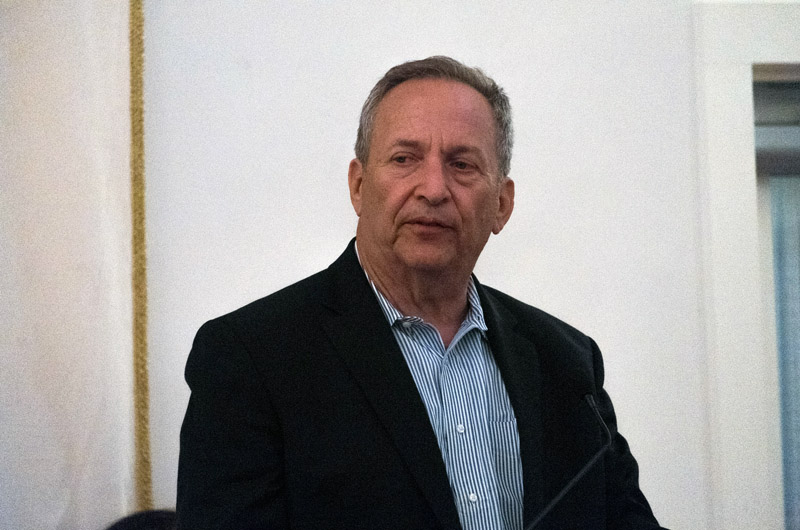After years of recession and national economic decline, the audience at the Martha’s Vineyard Hebrew Center on Thursday was perhaps hoping for some good news from the three renowned economists speaking that night.
There was little to go around.
Noting the title of the event, Is the US Future Stagnation and Inequality?, the event moderator, economist Allen Sinai, pointed out, “The word itself [stagnation] even indicates a gloomy prognosis for society.”
Many of the economists on stage seemed to agree.
“Productivity is not going zero, it’s probably just going to bubble along, but the kick of the dot com era is over,” said economist Bob Gordon. “We’ve got education, demographics, inequality and sociological change that are all going to create something that is going to be really hard to deal with.”
Mr. Gordon, the Stanley G. Harris Professor of Social Sciences at Northwestern, was joined onstage by Bob Solow, a distinguished economist who has won awards ranging from the Noble Prize in Economic Sciences to the Presidential Medal for Freedom. He now serves as a professor emeritus at MIT. The panel’s final member, Larry Summers, served in two separate presidential administrations and was the president of Harvard University from 2001-2006. Mr. Summers now serves as an economic advisor to several hedge funds.
“If you’ve studied economics, then you’ve probably spent a lot of time reading the work of the people who are sitting here,” said Joseph Bower, chairman of the Summer Institute as he introduced the three panelists. “They are not just amazing scholars, but they have also served their country and their government in many ways.”
The evening began with remarks by each of the three men, with Mr. Gordon going first and predicting a period of continued slow growth and stagnation for the United States, alongside massive inequality. He added to this the sociological divides growing in the country between rich and poor, black and white, and married and unmarried parents.
“That’s probably enough to get the evening started with a jolly outlook,” he joked to the crowd as he closed his remarks.
Mr. Summers, who went next, had somewhat better news for the crowd, pointing out that the U.S. did not enter a depression, as was imminently possible in the early years of the Great Recession.
“All the statistics were worse in the fall of 2008 than they were in the fall of 1929,” Mr. Summers said. “We didn’t have the depression that we very well could have had.”
Mr. Summers even ventured to say that his years spent traveling the world and looking at the economic issues plaguing other developed nations have led him to believe that no matter how bad the situation was in the U.S., he would still rather have the problems we are currently facing rather than those that many other advanced economies must deal with.
“In important respects,” he said. “The sun is shining.”
Pointing to the advances the country and the economy have made even while growth has slowed down, he noted that his smart phone had a higher computing power than the Apollo project, and probably a better communication system than the Kennedy White House.
But the stage’s one Nobel Laureate was quick to point out the destructive potential of economic inequality on the economy during his remarks. Noting the two sides of inequality at both the upper part and lower part of the income spectrum, Mr. Solow warned of the potential of each to wreak havoc on the nation.
“The basic problem with inequality at the top is that I think it’s a threat to democracy,” said Mr. Solow. “We’re already aware of the excessive influence of money in politics.”

Mr. Solow even warned of the potential for a perpetuating cycle in which this money at the top fueled an even larger growth of incomes for the top one per cent of Americans. Yet he cautioned that inequality at the other end of the spectrum should also be carefully taken into account.
“We have a larger tail of poor people than most large, industrialized countries have,” said Mr. Solow.
This poverty can be not only a drag on the economy, but also presents a social and moral challenge, he noted. Yet the solution was not totally clear. Redistribution could work, but wouldn’t necessarily be politically feasible according to Mr. Solow.
“We’re not a Robin Hood society,” he said. “And we’re never going to be.”
However, the main point to stress was that something did need to be done to reduce inequality if at all feasible. This message was clearly articulated by Mr. Solow and heartily repeated by the other economists on stage.
After each economist’s comments, several questions were taken from the audience ranging from the Greek financial crisis to mass incarceration. Each question in turn resulted in complex and multifaceted answers. As Mr. Gordon and Mr. Solow fired economic volleys back and forth over the retirement age, one attendee grumbled, “Never any easy answer, huh?”
The general consensus for policy prescriptions, however, was for more progressive taxation, higher investment in infrastructure, and an increase in poverty reduction programs such as the Earned Income Tax Credit or the minimum wage. The list was notably left-of-center, leading the moderator, Mr. Sinai, to point out that, “Not everyone here is a liberal Democrat.”
Still, political orientations aside, the discussion and debate did allow for a many complex policy prescriptions, to the point that as the event ended, Mr. Bower insisted on one sentence answers from each economist. This effort, however, proved to be unsuccessful, as could be expected with such questions as “Why is higher education more expensive?” or “What would you do if you were President?”
“Never ask an economist for a one sentence answer!” Mr. Sinai quipped as he thanked participants and closed the evening.








Comments
Comment policy »